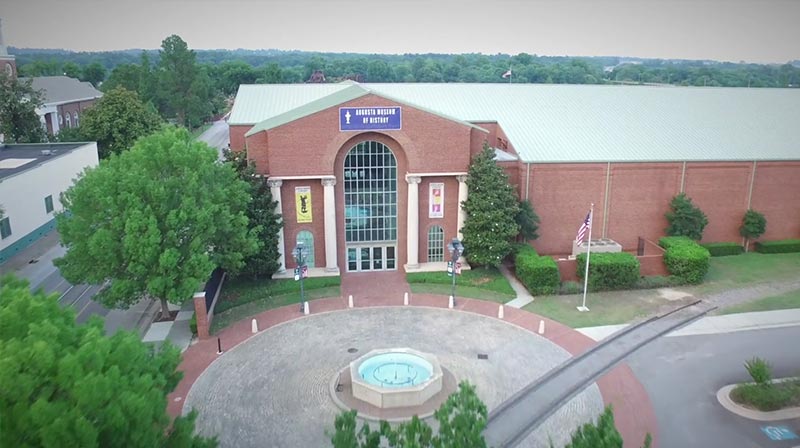The Augusta Museum of History hosted its annual Brown Bag series of historical lectures with guest speaker Lee Ann Caldwell on Wednesday, Jan. 11.
As a historian, prolific writer and native Augustan, Caldwell presented an overview of 21st century turning points, significant changes and “decisive moments.”
Despite her extensive experience teaching and lecturing, Caldwell said she had the hardest time preparing this year’s summary as historians typically try to identify patterns and trends through specific processes – those that cannot be applied to events within the last 20 years.
“There’s no way to get into the records and see what’s going on beyond what we’ve heard in the news, and that might not always be accurate,” she said. “So, until we get into more in-depth records, it’s hard to know everything that was going on … and perhaps most importantly, we don’t yet know the sustainability of particular changes. We don’t yet know what the long term effects are going to be.”
While Caldwell admits people can study the effects of World War II and the Vietnam War, closer events to the present are hard to predict because there is no way to study how it will affect or change different generations.
MORE: Nitty-Gritty co-founder John McEuen to bring Americana, gospel, bluegrass to Augusta stage
“Sometimes what looks like a turning point may turn out not to be a turning point,” she said.
Caldwell listed local events such as: the building of the Riverwalk, Lucy Laney Craft Museum, the Morris Museum of Art, the restoration of Woodrow Wilson’s house, the restoration of the Imperial Theater, the Jesse Norman Amphitheater, the Phinizy Water Resources, the Children’s Hospital of Georgia and the Augusta Greenway.
“They provide not just history, but all kinds of cultural opportunities,” she said.
Meanwhile, major events included Arts in the Hearts and drag boat racing that started in the 80s, which Caldwell said set the stage for other significant happenings in the 2000s.
However, according to Calrwell, the most important factor in creating trends and patterns was and is the economy. After the textile mills phased out and technology, specifically robotics, began to filter in, noteworthy companies and corporations were supported by the Chamber of Commerce.
“Groups like Procter & Gamble and International Paper … those kinds of big industries that made up what was called ‘miracle mile’ out in south Augusta put thousands of people to work,” she said.
Although some companies moved to other areas, Caldwell emphasized how E-Z-Go and ClubCar were most likely to stay in the city.
Evident by increasing traffic in Columbia County, Fort Gordon, soon to be known as Fort Eisenhower, will continue to push jobs and income, and Caldwell said regularly growing cyber interest will keep stabilizing the economy.
“That’s going to be the economic rock that replaces some of these things we have lost,” she said. “The choice of Augusta for the Army Cyber Center in 2016 and the Cyber School of Excellence not only is bringing these institutions here … but it’s also bringing thousands of people in.”
Caldwell said these events have led to a boom in housing and education departments that only further propelled cyber investment and engrossment. An increase in housing in the downtown area led to people wanting more restaurants, and this allowed for the downtown area to grow to consumer demand.
Caldwell said that preservation of the community and local history has also played a major role in Augusta’s timeline, as well as healthcare interest. Healthcare involvement led to the expansions and improvement of Augusta University and Augusta Technical College, which resulted in program growth and an increase in attending students.
“This is what is really interesting – we also now have a school of computer and cyber sciences. That would not have happened without this turning point and change in the economy,” she said.
Caldwell finished her overview by mentioning how the community has worked to improve itself both economically and socially.
“I think we don’t appreciate ourselves enough sometimes. So, as I look through these years and the events of these years, I was struck by how many things were related to culture, to quality of life, to preservation of the past and adapting to the new.”
MORE: Paine College will host the Annual Tri-College Dr. Martin Luther King Jr. 2023 Celebration
Museum staff mentioned upcoming events such as the next Brown Bag history talk, The Completion of Springfield Village Park, on February 8 at 12:30 p.m., and their Black History Month celebration on February 19 at 1 p.m.
“Although this event celebrates Black culture, we invite every ethnicity, every race, every heritage, every background and every age level to come and join us,” said Museum Education Manager Gayla Keesee. “We hope that you will be a part of the museum and what we do here.”
Keesee said the event will feature stories read by Joyce Law, crafts, a special African American history bingo game, live music from Created 2 Play – a drumline that has performed in the Atlanta Black History Month Parade – and more activities.
On Thursday evening, Jan. 12, the museum will host the 13th annual Jimmie Dyess Symposium where community leaders will be honored with awards.
For more information on upcoming events, visit: https://www.augustamuseum.org
Liz Wright is a staff writer covering education and general assignments for The Augusta Press. Reach her at liz@theaugustapress.com












